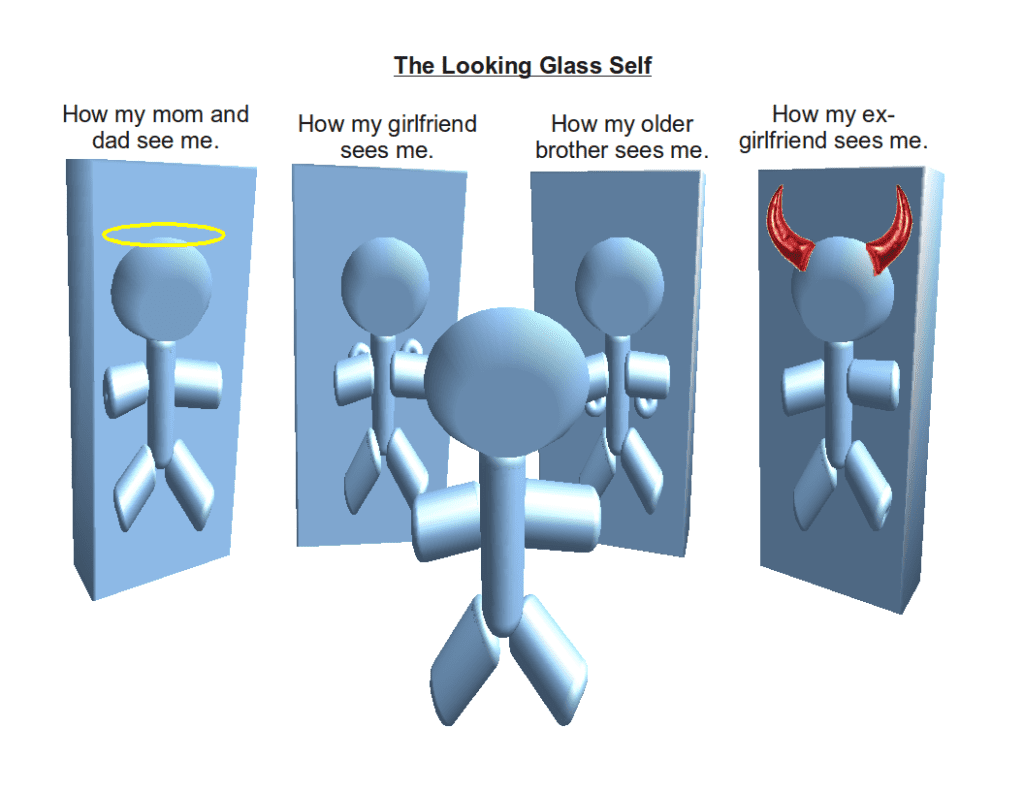
National Association of Christian Ministers Leadership Series
By Michael Mooney, NACM Exec. Elder
The looking glass self is the concept by C. Cooley that describes how we as humans use others as the standard of making judgments of ourselves. There are generally three steps in the process:
1) We form assumptions of how we appear to others
2) We then imagine what others think of that appearance
3) We then begin to develop perceptions of ourselves by what we believe others think about us
Phase 1 Here is an example, let’s say as a child named Fred enjoyed singing. One day a few members of his family overheard him and told him what a wonderful singer he was. By this he was surprised to hear because he never thought of himself this way.
Phase 2 After reflecting on their feedback he decided that it made him feel good. He began to see himself as a singer. With this new found talent he also started looking for opportunities and places where he could sing so that more people could hear his ability. He thought that they would appreciate him for being “gifted”.
Phase 3 After a number of favorable experiences where Fred received good feedback from singing in church, he began to feel all the more interested in singing Christian music. He began thinking about becoming a praise and worship leader. As the years went by he became more and more sure that God had called him to music ministry.
Thoughts
This is a rather positive example of how the looking glass self can work in the life of a child growing into adulthood. Nonetheless there are many negative examples also. But the point here is to demonstrate how people’s feedback (and the interpretations of such) can really shape the way we look at ourselves -even to the extent of making life decisions.
We might consider form the example: what if Fred never found a job in Christian music?
Would this mean that he may have never been called to this ministry in the first place?
Should his friends encourage him to keep trying to get that record deal, or church position -to never give up. Should they say, “follow your dreams and never let circumstances get in your way?”
These are very important questions (especially for leaders) because how Fred’s friends respond will inevitably result in more “feedback” into his life. If God has called him to music ministry the right advice is to encourage him to never quit. However, if he was mistaken about his calling (caused by the voices of previous positive feedback) he is only going to continue a path of frustration and disappointment if he is encouraged to “never give up”. In such a case his friends have done him a disservice in their “encouragement” -all the more if this encouragement comes from a leader, or even his pastor.
What’s the point here?
The point is that leaders need to know the power of their judgments of others (positive or negative). Negative feedback has the power to correct behavior (positive), or even destroy futures (negative). Positive feedback has the power to encourage positive actions, or even destroy them by perpetuating false hopes (negative). Therefore we must be very careful in making judgments of things. It is easy to determine negative judgments, but often people let their guard down when saying something positive -believing that encouragement can never hurt. People of influence must remember Jesus’ words:
Mat 12:36 MKJV
(36) But I say to you that every idle word, whatever men may speak, they shall give account of it in the day of judgment.
What is the solution? Maybe the best approach is to encourage people toward making their own judgments for themselves. In such cases they may be right or wrong, but we will not have become the contributors unto their decisions. This approach allows them to accept responsibility for their own outcomes. When those outcomes are good, they will be proud of themselves (and probably not remember our insight anyway). When those outcomes are negative, it becomes an opportunity for them to grow and improve. This one thing is for sure, when leaders “lead” people to negative outcomes, they lose a portion of their influence with others. The loss of influence is the loss of leadership.
For even deeper insight into the looking glass self, consider this scripture: “If someone listens to God’s word but doesn’t do what it says, he is like a person who looks at his face in a mirror, studies his features, goes away, and immediately forgets what he looks like” (Jas 1:23-24 GW).




